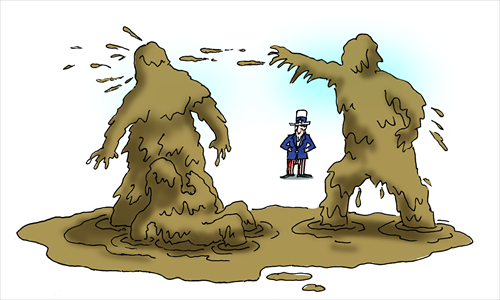American candidates stumble toward 2016 elections

Illustration: Liu Rui/GT
In 18 months, the US will elect a new president on November 8, 2016. There are plenty of contenders for the office, at least a dozen Republicans and a handful of Democrats. The nation's political elites are very interested in the contests for the nomination by the major parties. Among potential voters, that interest is decidedly lacking. The 60 or so percent of the electorate which is expected to vote is quite right to reserve its attention until later in the process. The spectacle presented by the nomination campaigns is a mixture of distortion and trivialization, of prejudice and personalization. It is also a financial orgy: The successful candidates will have spent nearly a billion each.
The situation of the Democrats is, apparently, clear. Hillary Clinton has the support of more than half the Democrats, her antagonists are much lesser known.
They are the former governor of Maryland, Martin O'Malley, the former Virginia senator and secretary of the navy James Webb and now the independent Senator from Vermont Bernie Sanders. He calls himself a "socialist" and declares that he will domesticate American capitalism and enable citizens to enjoy economic and social equality. Vice-President Joseph Biden has not ruled out running, but as time passes and he makes no move, the possibility becomes ever more remote.
Meanwhile, the factor that makes Clinton so dominant, her familiarity, is beginning to cause her difficulty. Many Democrats do not forgive her support for the Iraq war as senator and her aggressive foreign policy as secretary of state.
The same group thinks she was too close to finance and industry as senator, and too distant from the Democratic Party's social traditions. Webb, who fought in Vietnam, is especially critical of her failure to call for imperial retrenchment. Sanders portrays her as an ally of the very rich who unashamedly purchases political influence.
Clinton has as yet to pronounce on the new trade agreements, strenuously opposed by the shrunken US trade unions. Sanders, in his initial press and television interviews, has been unsparing in criticizing her equivocation.
Finally, there is the burden represented by Bill Clinton's departure from the party's social reformist legacy as president and the questions raised by his fundraising for the family foundation.
Still, women voters are in large numbers prepared to give her the benefit of the doubt to elect the US's first woman president. Barring unforeseen events, the nomination is hers.
That is the calculation of the Republicans, who frenziedly denounce Clinton - so much so that they sometimes set aside their obsessional hostility to Barack Obama.
The problem for the Republican candidates is that they do not disagree. They are proponents of small government, unregulated capitalism, reducing or eliminating programs like Social Security and Medicare. Obama's medical insurance program is an especially vexing theme and they promise to terminate it.
They depict the issue of climate change as a fiction devised by scientists to justify governmental intrusions. They express considerable hostility to the 11 million or so undocumented immigrants, mostly from Latin America. They dislike the African-American population, despite some token black Republicans. They consider the US a white and Christian nation, espouse Biblical literalism and oppose the teaching of evolution. They abhor, or claim to abhor, rights for homosexuals and are firmly opposed to homosexual marriage.
In foreign affairs, they deny that anything has changed in the world balance of power. They suppose that following US leadership is the duty of other nations, and regard Vladimir Putin's Russia and China as antagonists. They favor war against militant Islam and are unequivocal supporters of Israel. The Florida Senator who is running for president, Mario Rubio, is actively seeking to sabotage negotiations with Iran. They sponsor a domestic cult of firearms. They are vocal backers of the police and especially of their endemic war on citizens of color.
There are, literally, too many Republican candidates to name or describe all of them. They seek support from three groups. First there are the wealthy, able to finance their campaigns. The second consist of the party's militants - who think that any nuance, any hint of compromise with the Democrats, is betrayal. Over the horizon lies the rest of the US which does not share the views of the Republican faithful.
It may be that Jeb Bush, former governor of Florida will be the nominee. Actually, it is more likely to be the Governor of Wisconsin, Scott Walker, determined opponent of the public service unions and rigid in his religious conceptions.
It is unclear that the public with its economic worries will accept Republican ideology rather than Democratic projects of social reconstruction, however limited. Unfortunately, it is equally unclear that the US, riven with class, cultural, and racial divisions has a public life consonant with our claims to be an exemplary democracy.
The author is professor emeritus of Georgetown University Law Center. opinion@globaltimes.com.cn